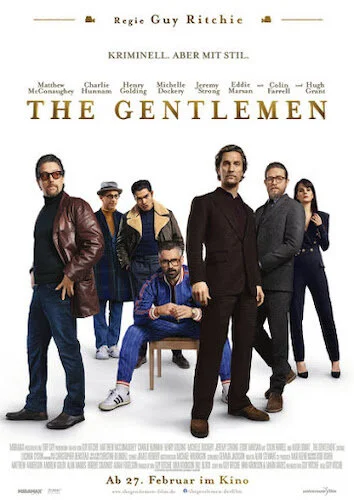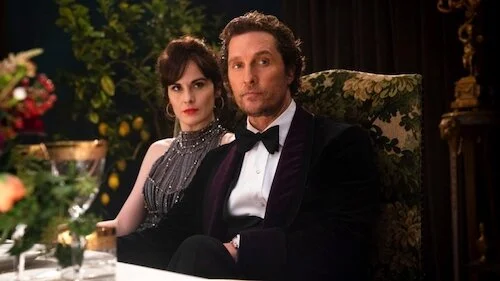The Gentlemen
I know I give Guy Ritchie a hard time with my reviews, but he showcases the same mistakes film after film. There’s nothing wrong with wanting to be ambitious or edgy, but I’m beginning to understand that the Hatfield filmmaker is maybe unsure of why daring decisions can work, as it seems like he just relies on kookiness to work all the time. As a naysayer, I must be honest, there were times that his latest offering, The Gentlemen, was one of his best works since Lock, Stock, and Two Smoking Barrels. Some of the lines actually had me laughing. A few direction-based decisions seemed rather clever (the meta joke about the idea of turning the plot within The Gentlemen into a film-within-a-film occasionally worked, for instance). Even some of his twists and turns actually felt earned, for once. The one concern here is that these moments were spread out, which is usually fine, but in this particular instance felt like the film’s saving graces, rather than true nature.
That is because many of Ritchie’s other elements here just seem far too try-hard. I don’t mean strictly in an ambitious sense. I mean this was like how I wrote films in high school. It’s 2020, and Ritchie still isn’t quite clear as to how he can separate disgusting characters from making his film disgusting. It’s one thing to have characters say bad things, even in the name of working blue. The Gentlemen is a constant barrage of sex jokes (mainly in a homoerotic sense), racial remarks, and female objectification. This continues in the plot devices including the urination on a dead body, the intention to rape a character to get back at a rival, and the forcing of a captive to sexually assault a pig. See, in something like Black Mirror, that latter part is handled with delicately, as to iron out the obvious discomforts created in such a disturbing subject matter. Here, nothing is handled properly. This is all in the name of running with that edge-lord baton. What Ritchie needs to realize is that dark jokes, dangerous wording and twisted scenarios basically have to be earned in a film, or serve a much larger good than just sticking out as a problematic scene (which is exactly the case here). We get the idea that the characters in The Gentlemen aren’t very likeable as human beings, but we realized that a few c-words and penis jokes earlier.
Mickey and Rosalind Pearson.
I know this is a Ritchie issue for two reasons. First, his mark is on all of the film’s story-telling elements, including (obviously) direction, production and screenwriting (having contributed to the actual story as well). Secondly, this type of extremism is found in most of his major works, down to the fundamentals. The opening thirty-plus minutes of background exposition is a mental marathon, and not in a good way. These are the buildups of our characters, folks, and it feels like a tedious joke or an advertisement for a mobile game that won’t turn off. Again, when The Gentlemen works, it’s easily some of Guy Ritchie’s most commendable material in ages; without spoiling, I’m thinking of the “rescue” scene tied to Raymond (which doubles as the start of everything going wrong), Fletcher’s true intentions, and more. Otherwise, The Gentlemen is riddled with far too many undertones (mostly homophobic, but toss racist and misogynistic in there too), exhausting decisions that only work as stand-alone ideas and not as a whole feature, and a focus on edginess over cohesion. It’s a shame. There are actual glimpses of something better, here: perhaps the bigger picture Guy Ritchie has chased for decades.
Andreas Babiolakis has a Masters degree in Film and Photography Preservation and Collections management from Ryerson University, as well as a Bachelors degree in Cinema Studies from York University. His favourite times of year are the Criterion Collection flash sales and the annual Toronto International Film Festival.





